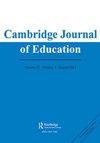在项目工作中,在学生开始的案头指导之间建立理解
IF 1.5
3区 教育学
Q2 EDUCATION & EDUCATIONAL RESEARCH
引用次数: 0
摘要
摘要本研究调查了在很少研究的教学和互动环境中,即在案头教学(BDI)期间的师生互动中,如何建立共同理解。具体而言,作者关注的是学生在高中瑞典语课堂上基于项目的语言教学中发起的教学互动,并探讨学生对教师先前反应的理解如何影响随后的互动轨迹。他们的会话分析调查显示,教师根据学生的理解公式产生确认或否定的动作。这些反应类型完成了两种不同形式的互动工作:(a)当老师确认学生的公式时,她通过与教学相关的阐述来扩展序列;以及(b)当老师没有确认公式时,她会解释这一点,促使学生重新表述他们的理解。总的来说,这项研究有助于BDI的研究,因为它是项目工作中反复出现但调查不足的课程实践。本文章由计算机程序翻译,如有差异,请以英文原文为准。
Establishing understanding during student-initiated between-desk instructions in project work
ABSTRACT This study investigates how shared understanding is established during a rarely researched instructional and interactional context, namely teacher–student interactions during between-desk instructions (BDIs). Specifically, the authors focus on instructional interactions initiated by students during project-based language teaching in an upper-secondary Swedish classroom and probe into how students’ formulations of understanding of a teacher’s prior responses shape the subsequent interactional trajectories. Their conversation analytic investigation reveals that the teacher produces either confirming or disconfirming actions following students’ formulations of understanding. These response types accomplish two distinct forms of interactional work: (a) when the teacher confirms the students’ formulations, she expands the sequence with instruction-related elaborations; and (b) when the teacher does not confirm the formulations, she accounts for that, prompting students to reformulate their understanding. Overall, this study contributes to the body of research on BDIs as a recurring yet under-investigated lesson practice during project work.
求助全文
通过发布文献求助,成功后即可免费获取论文全文。
去求助
来源期刊

Cambridge Journal of Education
EDUCATION & EDUCATIONAL RESEARCH-
CiteScore
5.30
自引率
4.30%
发文量
35
期刊介绍:
Cambridge Journal of Education publishes original refereed articles on all aspects of education, with a particular emphasis on work that contributes to a shared understanding amongst academic researchers, theorists, practising teachers, policy-makers and educational administrators. The journal also welcomes the submission of systematic review articles that summarise and offer new insights into specific areas of educational concern. With a wide international readership, Cambridge Journal of Education publishes contributions drawn from different educational systems and cultures enabling continued in-depth discussion of global educational theory, policy and practice. The journal’s Special Issue programme encourages and stimulates focused discussion and engagement with significant themes and responses to topics raised by readers and contributors. Cambridge Journal of Education welcomes proposals for future editions.
 求助内容:
求助内容: 应助结果提醒方式:
应助结果提醒方式:


